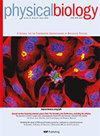皮层神经网络非确定性计算的热力学模型
IF 1.6
4区 生物学
Q4 BIOCHEMISTRY & MOLECULAR BIOLOGY
引用次数: 0
摘要
大脑皮层中的神经元群进行概率编码,以高精度和非凡的能效对周围环境的状态进行有效编码。一种新方法将大脑皮层神经元信号转导结果的固有概率性质建模为非确定性计算的热力学过程。采用均值场方法,与参考哈密顿相比,试验哈密顿的可用自由能最大化,熵的净量最小化。在计算过程中,热力学量始终保持不变;产生信息必须消耗自由能,而在信息压缩过程中,随着编码系统与其周围环境之间相关性的确定,自由能会被释放出来。由于吉布斯自由能方程和内斯特方程之间的关系,自由能的任何增加都会伴随着膜电位的局部降低。因此,这一热力学计算过程会调整每个神经元点燃动作电位的可能性。该模型表明,通过在一定时间演化过程中优化重新分配哈密顿的高能效计算过程,嘈杂的大脑皮层神经元可以实现非确定性的信号传导结果。计算结果表明,人脑的能效与这种非确定性计算模型是一致的,净熵产生得太低,以至于无法保留经典系统的假设。本文章由计算机程序翻译,如有差异,请以英文原文为准。
A thermodynamical model of non-deterministic computation in cortical neural networks
Neuronal populations in the cerebral cortex engage in probabilistic coding, effectively encoding the state of the surrounding environment with high accuracy and extraordinary energy efficiency. A new approach models the inherently probabilistic nature of cortical neuron signaling outcomes as a thermodynamic process of non-deterministic computation. A mean field approach is used, with the trial Hamiltonian maximizing available free energy and minimizing the net quantity of entropy, compared with a reference Hamiltonian. Thermodynamic quantities are always conserved during the computation; free energy must be expended to produce information, and free energy is released during information compression, as correlations are identified between the encoding system and its surrounding environment. Due to the relationship between the Gibbs free energy equation and the Nernst equation, any increase in free energy is paired with a local decrease in membrane potential. As a result, this process of thermodynamic computation adjusts the likelihood of each neuron firing an action potential. This model shows that non-deterministic signaling outcomes can be achieved by noisy cortical neurons, through an energy-efficient computational process that involves optimally redistributing a Hamiltonian over some time evolution. Calculations demonstrate that the energy efficiency of the human brain is consistent with this model of non-deterministic computation, with net entropy production far too low to retain the assumptions of a classical system.
求助全文
通过发布文献求助,成功后即可免费获取论文全文。
去求助
来源期刊

Physical biology
生物-生物物理
CiteScore
4.20
自引率
0.00%
发文量
50
审稿时长
3 months
期刊介绍:
Physical Biology publishes articles in the broad interdisciplinary field bridging biology with the physical sciences and engineering. This journal focuses on research in which quantitative approaches – experimental, theoretical and modeling – lead to new insights into biological systems at all scales of space and time, and all levels of organizational complexity.
Physical Biology accepts contributions from a wide range of biological sub-fields, including topics such as:
molecular biophysics, including single molecule studies, protein-protein and protein-DNA interactions
subcellular structures, organelle dynamics, membranes, protein assemblies, chromosome structure
intracellular processes, e.g. cytoskeleton dynamics, cellular transport, cell division
systems biology, e.g. signaling, gene regulation and metabolic networks
cells and their microenvironment, e.g. cell mechanics and motility, chemotaxis, extracellular matrix, biofilms
cell-material interactions, e.g. biointerfaces, electrical stimulation and sensing, endocytosis
cell-cell interactions, cell aggregates, organoids, tissues and organs
developmental dynamics, including pattern formation and morphogenesis
physical and evolutionary aspects of disease, e.g. cancer progression, amyloid formation
neuronal systems, including information processing by networks, memory and learning
population dynamics, ecology, and evolution
collective action and emergence of collective phenomena.
 求助内容:
求助内容: 应助结果提醒方式:
应助结果提醒方式:


